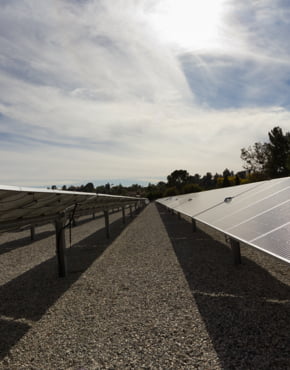Pure Water Southern California to receive nearly $100 million to advance development of new climate-resilient water supply
CARSON, Calif. – Metropolitan Water District’s program to create a new water supply for Southern California by purifying water currently being sent to the ocean received a funding boost today from the U.S. Bureau of Reclamation.
Reclamation Commissioner Camille Calimlim Touton announced the $99.2 million in funding for Pure Water Southern California at an event held at the regional recycled water program’s demonstration plant in Carson, where she was joined by U.S. Sen. Alex Padilla, U.S. Rep. Grace Napolitano, California State Water Resources Control Board Chair Joaquin Esquivel and representatives from Metropolitan, the Los Angeles County Sanitation Districts, and other water agencies that were awarded federal funds.
“Adequate, resilient and safe water supplies are fundamental to the health, economy and security of our communities. Investment in water recycling and reuse are key to stretching limited water supplies, making systems more resilient to the effects of aridification in the American West,” Touton said. “Water recycling is an innovative and cost-effective tool that can help make our water supplies more reliable, helping communities find new sources to meet their needs today, but most importantly to meet our needs in the future.”
Metropolitan and the Sanitation Districts are partnering on the Pure Water project, which will take cleaned wastewater that is currently sent to the ocean and purify it using an advanced, multi-stage purification process to produce high-quality drinking water. If approved by Metropolitan’s board, at full scale, the program will produce 150 million gallons of water each day – enough to meet the demands of 500,000 homes – that will be delivered to groundwater basins, industrial facilities and two of Metropolitan’s water treatment plants.
“Purified recycled water isn’t just a new supply of water, it is a climate-resilient one. That is precisely what we need as climate change challenges us with increasingly dramatic swings in weather, when every drought seems to be worse than the one before. Having a dependable supply of water, unaffected by the weather, will provide our communities a critical source of reliability,” said Metropolitan board Chair Adán Ortega, Jr. “We are immensely grateful to our federal partners for their support.”
The newly announced federal funds will help advance design work and improvements to existing infrastructure needed for the project. Construction could begin as soon as 2026 and the first water could be delivered in 2032.
Metropolitan General Manager Adel Hagekhalil thanked Commissioner Touton and the Biden administration for their investment in the Pure Water program.
“Ensuring Southern California has a reliable water supply takes us all working together. And it also benefits the entire state and country, not just the 19 million people who live here. Our businesses and industries are an economic engine for the nation. And we need water to make that engine run,” Hagekhalil said.
“The Pure Water demonstration project is primed to evolve and become a long-term solution to meet the needs of our region’s water demands using our last untapped source of wastewater,” said Robert Ferrante, general manager and chief engineer of the Los Angeles County Sanitation Districts. “We are grateful for the generous support of our agency partners and the Bureau of Reclamation’s financial commitment to help us achieve this goal."
What the speakers said:
“We know that it’s only a matter of time until the next devastating drought, which is why we need every tool at our disposal to protect our region’s precious water supplies. Today’s announcement, made possible by Bipartisan Infrastructure Law investments in large-scale water recycling projects, will help us build a more reliable, more resilient water supply in Southern California.”
– U.S. Sen. Alex Padilla (D-Calif.)
“I want to thank the Bureau of Reclamation Commissioner, and my friend, Camille Touton, for gathering us to announce this long-awaited enormous investment into our large-scale regional projects. I can’t think of a better facility to be at nor to receive these critical funds: Pure Water. The Pure Water Project is a shining example of what the partnership between local water agencies like the Metropolitan Water District of Southern California and the Los Angeles County Sanitation Districts can accomplish. Water instability and unpredictable drought cycles will affect us for years to come, and ensuring water security for our communities requires this type of collaboration between all, as well as a commitment to dedicate funding to support water recycling projects. I am incredibly grateful for the leadership of not only my colleagues in Congress who fought to secure the funding being awarded today, but also for our partnership with the Bureau, which has worked tirelessly in the Biden-Harris administration to fund critical water infrastructure projects. I look forward to our continued efforts to ensure further investments into water recycling, especially the Large-Scale Water Recycling Program, and to get more money out the door.”
– U.S. Rep. Grace Napolitano (D-El Monte)
“Water recycling is a key part of Governor Newsom’s Water Supply Strategy to make up for the water we expect to lose by 2040 due to hotter, drier conditions. Thanks in part to federal-state partnership through the Clean Water State Revolving Fund, the board has distributed over $1.7 billion since 2019 to water recycling projects. Water recycling is a critical and capital-intensive component of our long-term plans, and additional federal support of major recycling efforts like these will help California confront its climate challenges.”
– Joaquin Esquivel, Chair of the State Water Resources Control Board
The Metropolitan Water District of Southern California is a state-established cooperative that, along with its 26 cities and retail suppliers, provides water for 19 million people in six counties. The district imports water from the Colorado River and Northern California to supplement local supplies, and helps its members to develop increased water conservation, recycling, storage and other resource-management programs.
Media Contacts
